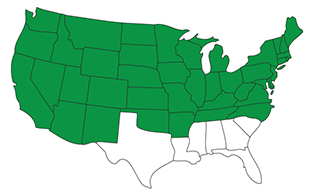
Winter Grain Mite
Penthaleus major
The Winter Grain Mite is a relatively large lawn pest that can do seasonal damage to lawns throughout much of North America. Also known as Penthaleus major, this lawn pest commonly attacks Kentucky Bluegrass, Perennial Ryegrass, Fescues and Creeping Bentgrass.
Identify

Leaf & Stem
The Winter Grain Mite is larger than other lawn-damaging mites and is easily visible by the naked eye. This lawn pest has an olive-black body with bright red-orange legs and mouthparts. Also visible is a pair of white eye spots and a dorsal anus. The eggs of the Winter Grain Mite are reddish-orange and shiny at first, and then become wrinkled and more straw-colored after a day or two. The activity and damage caused by this mite are restricted to the winter months, meaning Winter Grain Mite damage is often mistaken for snow mold or winterkill. The symptoms of grass injury are the same as those associated with winter desiccation—the only difference in an affected lawn is the presence of mites. Symptoms of damage from these lawn pests can also resemble that of frost damage in the early spring. Winter Grain Mites are most active at night and on dark, cloudy days. When disturbed, a droplet of liquid appears at the anal opening. This droplet, along with the dorsal anus, is only visible with a 10X lens.
Life Cycle
This lawn pest produces eggs from June to October, and the majority of this mite's activity is during the winter months. Two overlapping generations may occur during the winter with peak populations found in late December and late February.

Control
There are two methods for controlling White Grain Mites that TruGreen® recommends: 1. Use professionally applied pest control designed to prevent excess lawn pest populations, which can cause damage to your lawn 2. Kill insects, grubs and other lawn pests before they have a chance to damage your lawn Proper mowing and watering techniques can also help foster a healthy lawn that's more tolerant to lawn pest attacks—plus you'll get a lawn you'll want to live on in the process.







